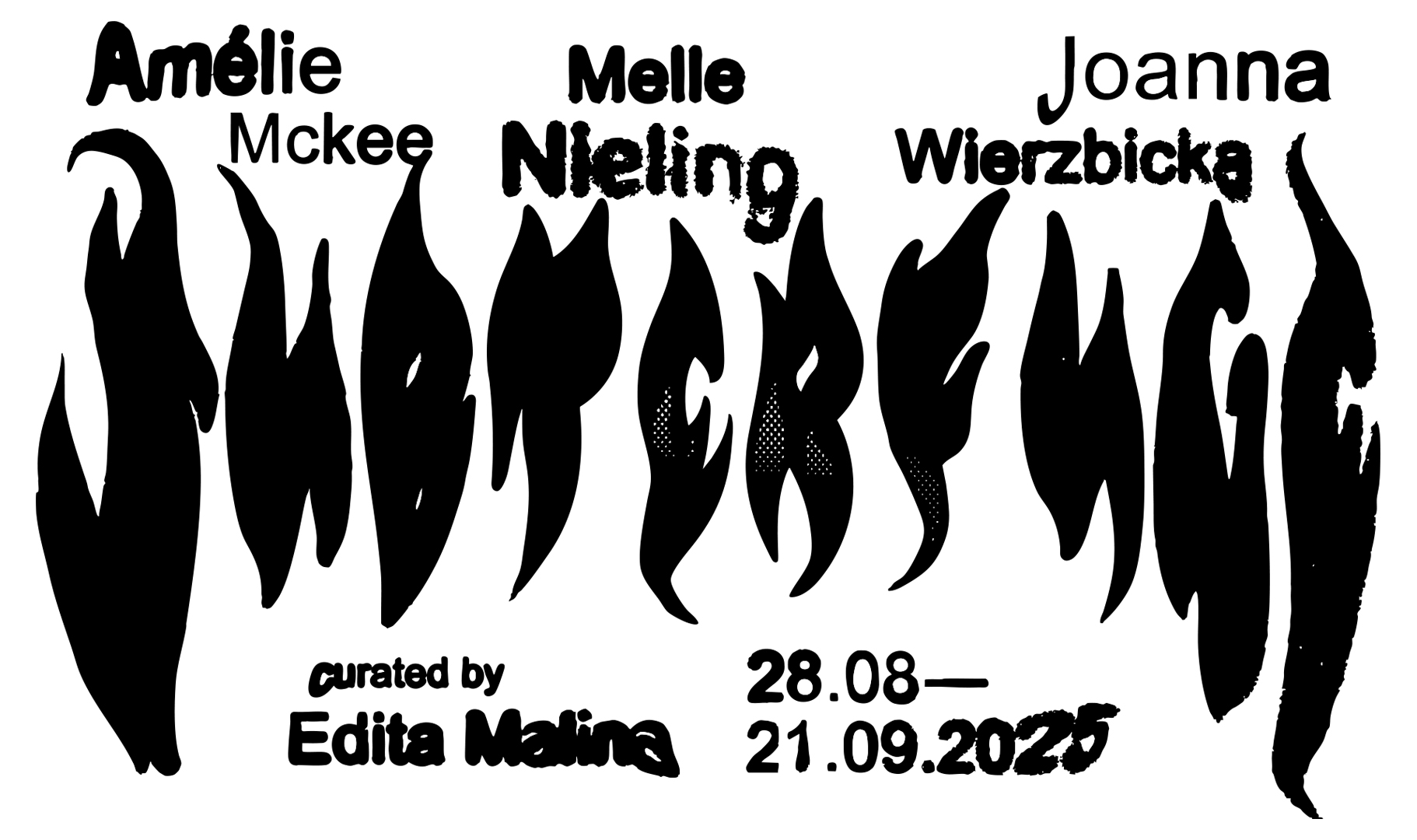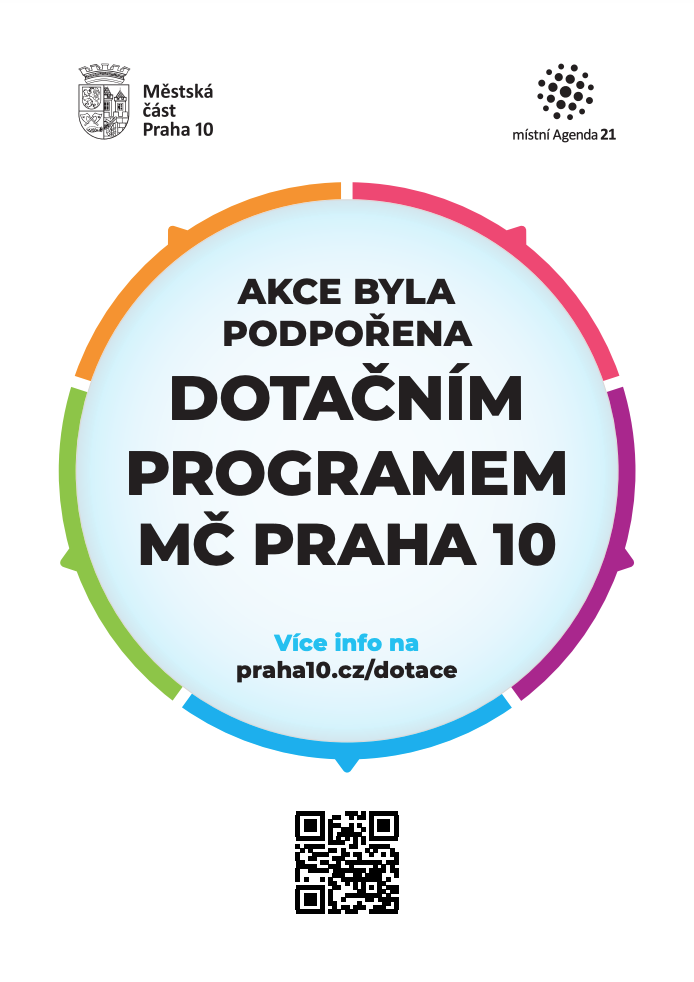
SUBTERFUGE by Amélie Mckee, Melle Nieling & Joanna Wierzbicka
JEDNA DVA TŘI Gallery
28. 08. - 21. 09. 2025
Vstupné: dobrovolné
Entry: donation
SUBTERFUGE by Amélie Mckee, Melle Nieling & Joanna Wierzbicka
curated by Edita Malina (@edita.malina)
In an age where conspiracy theories and technological paranoia permeate discourse, the boundary between justified concern and irrational fear grows increasingly blurred. These three artists probe this territory by presenting works that embody mechanisms of deception and surveillance.
Melle Nieling constructs an elaborate fiction around a film that never existed, crafting its material traces, such as posters, DVD cases, promotional footage, and screenplay, until the phantom movie feels as real as any other film. His practice reveals how easily we can be convinced of something’s existence through its artifacts, mirroring how the accumulation of information in the data age fosters conspiracies.
Amélie Mckee’s proposed sculptures continue her ongoing investigation into antenna making and its perepherial subcultures.Drawing from both scientific research and esoteric traditions, her works present hybrid entities that reference orgonite artists and related cultural phenomenas. Her chimeric technologies, part ritual object, part surveillance tool, embody our cultural fears about evolution and technological determinism. Mckee’s work renders visible the hidden forces of technology that drive our deeper emotional drives.
Joanna Wierzbicka’s soft, flesh-like sculptures present bodies in constant adaptation, hovering between organic and artificial, familiar and alien. These speculative appendages, imagined for survival in hostile environments, give form to our collective anxieties. Like the fictional organisms of conspiracy theories, they suggest a future where adaptation becomes a kind of camouflage. Her holobionts blur the boundaries between self and environment, organism and technology, raising questions about what forms of transformation survival might demand in an ever-shifting world.
Together, these works create a hall of mirrors where paranoia meets confirmation, where the tools of deception become the means of survival. The exhibition asks: in a world where everything can be fabricated, how do we distinguish between legitimate concern and manufactured fear?
Melle Nieling is a visual artist and curator. Their work ranges from large physical installations to single-page websites that question the processes behind the attribution of value and identity. Through pseudo-documentaries, fake corporate entities, and replicated everyday objects, they highlight problems with veracity in contemporary society.
Melle Nieling’s work has been exhibited internationally in
Europe and the US, with Gossamer Fog, inter.pblc, Shipton & semester9, a&o Kunsthalle, TETEM, Harlesden High Street, and SARA’S (with Plicnik Collective), among others. They are a dual recipient of the Mondriaan Fonds stipend for emerging talent, having been awarded the honour in both 2022 and 2023, and received a Cultuurfonds Young Talent Award in 2019.
As co-founder of Plicnik Space Initiative and Plicnik Collective, Melle collaboratively creates and curates physical and online shows with Amélie Mckee and others. They live and work between London, United Kingdom and the Netherlands.
Amélie Mckee (b.1996, FR&GB) is a visual artist who works across installations, singular objects, and collaborative
curatorial projects, with a focus on the conditions set by industrial infrastructures such as electricity grids, Wi-Fi, radio frequencies, and smart technologies. Her research taps into how technologies are fetishized as mystical, impenetrable objects and yet composed of rudimentary materials. Speculative design has a central role her practice Incorporating industrial components like buttons, cables, switches, and metal parts, creating the impression of functional devices, though their purpose remains obscured.
Recent projects include Immaterial Gelatine, Sherbert Green, London (2025); Artist Run Fair, Willie Willie Studio, Brussels (2025); LOG 3: Interceptor, Plicnik Space Initiative, London (2024); Post Facscism, Loods6, Amsterdam (2024); Scrapyard Screenings, Sara’s Worldwide, New York (2023); The Amazing Sex Show, inter.pblc, Copenhagen (2023); Eternal Maze residency, Petrohradská kolektiv, Prague (2023). She holds a MA from RCA CAP: critical practice (2021) and a BA Fine Art from Chelsea College of Art (2018).
She co-runs Plicnik Space Initiative with Melle Nieling based in Enclave, London.
Joanna Wierzbicka works across sculpture, photography, and installation, with a particular focus on fabrics—used clothing, printed, or dyed textiles. She creates sculptures that explore the interplay between soft/hard and tension developed through the genre of body horror, where forms resembling intestines, organs, organisms and monstrous shapes emerge.
Through her work, she emphasises matter as a living and
active participant of reality. She is interested in human and
other than human bodies and the wider material world of uneven and porous interactions we are in. Through the lens of biological processes such as composting, digesting, breathing, she explores the dynamic relations of our bodies and how they extend beyond the skin. They are not fixed or isolated, but rather fluid and in constant dialogue with the world.
Joanna Wierzbicka is a Polish-born London-based artist. She graduated from ECAL (École Cantonale d’Art de Lausanne) and University of the Arts London. A recipient of the Swiss Government Excellence Scholarship, her work has been shown at Saatchi Gallery, Split Gallery, Bomb Art Factory Foundation, Generation & Display Gallery in London, Fort Institute of Photography in Warsaw, Jedna Dva Tri Gallery in Prague and Espace Arlaud in Lausanne. She was a resident at Petrohradská Kolektiv in Prague and participated in the ING Polish Art Foundation Summer School. Her projects have been featured in Mold Magazine, Ofluxo, Tique Art, Kubaparis, Gaze Magazine, Easttopics and others.
curated by Edita Malina (@edita.malina)
In an age where conspiracy theories and technological paranoia permeate discourse, the boundary between justified concern and irrational fear grows increasingly blurred. These three artists probe this territory by presenting works that embody mechanisms of deception and surveillance.
Melle Nieling constructs an elaborate fiction around a film that never existed, crafting its material traces, such as posters, DVD cases, promotional footage, and screenplay, until the phantom movie feels as real as any other film. His practice reveals how easily we can be convinced of something’s existence through its artifacts, mirroring how the accumulation of information in the data age fosters conspiracies.
Amélie Mckee’s proposed sculptures continue her ongoing investigation into antenna making and its perepherial subcultures.Drawing from both scientific research and esoteric traditions, her works present hybrid entities that reference orgonite artists and related cultural phenomenas. Her chimeric technologies, part ritual object, part surveillance tool, embody our cultural fears about evolution and technological determinism. Mckee’s work renders visible the hidden forces of technology that drive our deeper emotional drives.
Joanna Wierzbicka’s soft, flesh-like sculptures present bodies in constant adaptation, hovering between organic and artificial, familiar and alien. These speculative appendages, imagined for survival in hostile environments, give form to our collective anxieties. Like the fictional organisms of conspiracy theories, they suggest a future where adaptation becomes a kind of camouflage. Her holobionts blur the boundaries between self and environment, organism and technology, raising questions about what forms of transformation survival might demand in an ever-shifting world.
Together, these works create a hall of mirrors where paranoia meets confirmation, where the tools of deception become the means of survival. The exhibition asks: in a world where everything can be fabricated, how do we distinguish between legitimate concern and manufactured fear?
Melle Nieling
Melle Nieling is a visual artist and curator. Their work ranges from large physical installations to single-page websites that question the processes behind the attribution of value and identity. Through pseudo-documentaries, fake corporate entities, and replicated everyday objects, they highlight problems with veracity in contemporary society.
Melle Nieling’s work has been exhibited internationally in
Europe and the US, with Gossamer Fog, inter.pblc, Shipton & semester9, a&o Kunsthalle, TETEM, Harlesden High Street, and SARA’S (with Plicnik Collective), among others. They are a dual recipient of the Mondriaan Fonds stipend for emerging talent, having been awarded the honour in both 2022 and 2023, and received a Cultuurfonds Young Talent Award in 2019.
As co-founder of Plicnik Space Initiative and Plicnik Collective, Melle collaboratively creates and curates physical and online shows with Amélie Mckee and others. They live and work between London, United Kingdom and the Netherlands.
Amélie Mckee
Amélie Mckee (b.1996, FR&GB) is a visual artist who works across installations, singular objects, and collaborative
curatorial projects, with a focus on the conditions set by industrial infrastructures such as electricity grids, Wi-Fi, radio frequencies, and smart technologies. Her research taps into how technologies are fetishized as mystical, impenetrable objects and yet composed of rudimentary materials. Speculative design has a central role her practice Incorporating industrial components like buttons, cables, switches, and metal parts, creating the impression of functional devices, though their purpose remains obscured.
Recent projects include Immaterial Gelatine, Sherbert Green, London (2025); Artist Run Fair, Willie Willie Studio, Brussels (2025); LOG 3: Interceptor, Plicnik Space Initiative, London (2024); Post Facscism, Loods6, Amsterdam (2024); Scrapyard Screenings, Sara’s Worldwide, New York (2023); The Amazing Sex Show, inter.pblc, Copenhagen (2023); Eternal Maze residency, Petrohradská kolektiv, Prague (2023). She holds a MA from RCA CAP: critical practice (2021) and a BA Fine Art from Chelsea College of Art (2018).
She co-runs Plicnik Space Initiative with Melle Nieling based in Enclave, London.
Joanna Wierzbicka
Joanna Wierzbicka works across sculpture, photography, and installation, with a particular focus on fabrics—used clothing, printed, or dyed textiles. She creates sculptures that explore the interplay between soft/hard and tension developed through the genre of body horror, where forms resembling intestines, organs, organisms and monstrous shapes emerge.
Through her work, she emphasises matter as a living and
active participant of reality. She is interested in human and
other than human bodies and the wider material world of uneven and porous interactions we are in. Through the lens of biological processes such as composting, digesting, breathing, she explores the dynamic relations of our bodies and how they extend beyond the skin. They are not fixed or isolated, but rather fluid and in constant dialogue with the world.
Joanna Wierzbicka is a Polish-born London-based artist. She graduated from ECAL (École Cantonale d’Art de Lausanne) and University of the Arts London. A recipient of the Swiss Government Excellence Scholarship, her work has been shown at Saatchi Gallery, Split Gallery, Bomb Art Factory Foundation, Generation & Display Gallery in London, Fort Institute of Photography in Warsaw, Jedna Dva Tri Gallery in Prague and Espace Arlaud in Lausanne. She was a resident at Petrohradská Kolektiv in Prague and participated in the ING Polish Art Foundation Summer School. Her projects have been featured in Mold Magazine, Ofluxo, Tique Art, Kubaparis, Gaze Magazine, Easttopics and others.
Provoz kulturních aktivit Petrohradská kolektiv je v roce 2025 finančně podpořen Ministerstvem kultury ČR, Hlavním městem Praha a Městskou částí Prahy 10, Národním plánem obnovy ze zdrojů Evropské unie.
The production of the cultural activities of the Petrohradská kolektiv is financially supported in 2025 by the Ministry of Culture of the Czech Republic, Capital city of Prague, and the Municipal District of Prague 10.


